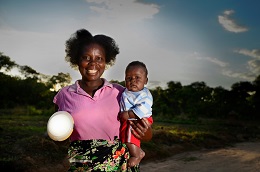Google Funds Research on Impact of Solar Lighting on Poverty Alleviation

Google is funding a two-year study on the impact of solar lights on poverty alleviation. Google has put up $650,000 for a Randomised Control Trial study (RCT), the first large-scale research project of its kind, for pico-solar lights.
The study will be undertaken by SolarAid,a leading distributor of solar lights in Africa.
At the inauguration of the study mid-February, Jacquelline Fuller, a Director at Google.org said: “Research is an incredibly powerful tool in the fight against poverty. SolarAid has committed to rigorously assessing their programs and openly sharing their findings, and not just the rosy ones, to make sure they’re making a big impact in people’s lives. We’re excited to further support their mission.”
Solar lighting has the potential to transform people’s quality of life through reduced indoor air pollution, and to unlock their socio-economic potential through extended productive hours for study and business. The switch from expensive lighting fuels such as kerosene, candles or batteriesenables families to redirect income saved towards health, education and capitalizing their businesses.
SolarAid’sDirector of Researchand Impact Kat Harrison said: “Despite being such an important field, there is not a lot of empirical evidence out there on the links between solar lighting and poverty alleviation. This hinders our, and the sector’s, ability to advise on policy, make recommendations to governments and to fully explain just what impact a pico-solar light can have”.
SolarAidwill engage and update interested stakeholders in the course of this study. You can follow the updates here.

